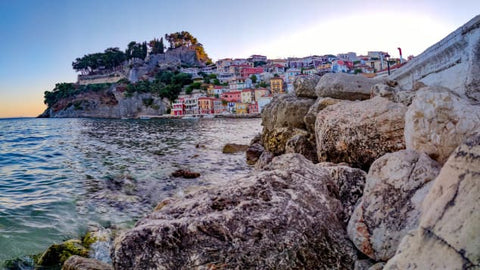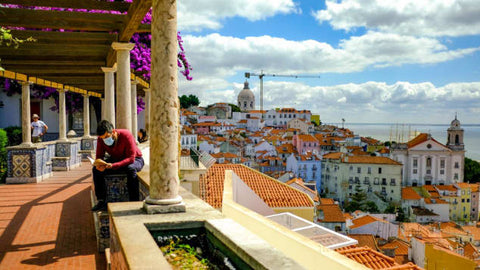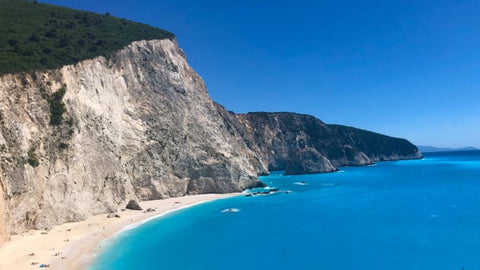The Battle To Become Europe's Safest Holiday Destination

They've both got beaches, food, history and sunshine, but two leading tourist destinations are now selling themselves as Europe's safest as they try to lure the visitors they need to prop up economies fried by the coronavirus.
Both Portugal and Greece, which this week opened their doors wider to international visitors, are trumpeting relatively low infection rates and widespread measures to keep the virus in check.
And both face financial peril unless they can persuade the tourists to come.
Portuguese Prime Minister António Costa believes his country remains as attractive as ever, but has launched a new campaign highlighting its safety. "All the reasons to visit Portugal are still here so tourists are welcome," he tells CNN.
Portugal has one of Europe's lowest death tolls from Covid-19 -- 1,520 fatalities among a population of fewer than 11 million -- and the government hopes its handling of the pandemic will help the country beat out other nations as it tries to convince would-be travelers to visit.

"We are among the countries that tested the most, we're one of the countries that better knows the real spread of the virus, where the numbers are the safest and where people can come with confidence," Costa says proudly. "Confidence will be one of the differentiating factors at the moment of choosing where to go on holidays -- I think that Portugal is a good destination."
His comments are mirrored by his counterpart in Greece, Kyriakos Mitsotakis, who says his country's top priority is safety as this week it opens seasonal hotels to visitors from across Europe.
"I am not interested in making Greece the number one destination in Europe," Mitsotakis says. "I am interested in making Greece the safest destination in Europe."
'Clean and safe'
In Portugal, part of the efforts to build up that confidence has been the introduction of hygiene certification to designate tourist facilities as "clean and safe."
"We've created a protocol between the health authorities, all the hotels, to create a special seal, clean and safe, to give everyone guarantees so that they can come and they'll be safe," Costa says. Some 14,000 businesses have received the seal and 15,000 employees have been trained, officials say.
Although the prime minister admits the numbers won't be as good as in previous years, Costa says there are good indicators that occupancy rates will be at robust levels.
It's still early in the summer season, but both countries are off to a slow start.
Lisbon's old town neighborhood of Alfama -- usually packed with tourists on a sunny day -- is still quiet. The area, vacated by many residents over the past decade due to the gentrification that saw many buildings turned into tourist accommodation, is only just beginning to open up restaurants, shops and cafes closed during the height of the virus.
"We were forced to close our store for about two months, the last time we closed was in 1977," says Miguel Clarinha, an owner and manager of Pasteis de Belem, a Lisbon institution that sells the country's famous Pasteis de Nata custard tarts.
He says since reopening in mid-May, business has been between 15-20% of normal. The shop, he says, is selling about 4,000 tarts daily compared to the usual figure of 30,000.
"We're hopeful of course but we also know this year is going to be a slow year," he says.
Crowd-free beaches

It's a similar picture in Greece where about 90% of tourism revenue comes from international visitors. The country will be lucky to see anywhere near the 33 million visitors, bringing an estimated $20 billion, that it received in 2019.
But while beautiful shorelines like rugged Porto Katsiki on the Ionian island of Lefkas -- regularly featured on global best beaches lists -- are currently crowd-free, they're expected to get busier as Greece begins the gradual opening of its borders.
With considerably fewer virus fatalities than Portugal, Greece is being hailed as one of the safest countries for holidaymakers in the Mediterranean this summer. It's seen under 200 deaths from Covid-19 and a little over 3,000 cases in a population of 11 million.
Greece's opening is gradual, starting with a bridge period until June 30, during which international passenger flights will only be allowed to enter Greece via its two main airports in Athens and Thessaloniki.
Direct international flights to the country's many tourism destinations will resume as of July 1. Ferries from other countries will also be permitted to dock from July.
The opening means that passengers from a list of dozens of countries with low infection rates can now enter Greece, subject to random tests. The list is expected to be extended by July.
Those arriving from airports that are on a "black list" of high transmission areas compiled by the EU's Aviation Safety Agency (EASA) have to test and must quarantine overnight pending results.
Even if the results are negative, travelers arriving from high risk areas will have to self-quarantine for a week at their arrival destination. Those who test positive will be quarantined for up to 14 days.
Quarantine hotels

Greece hopes its early success in the fight against the virus will translate into receipts, in an industry that accounts for more than 20% of the country's GDP and one in four jobs.
As in Portugal, strict health and safety protocols have been introduced. Hotels are required to have a contracted physician on call while employees must have to take regular tests.
At popular destinations "Covid-19 rooms," or in some cases designated hotels, have been set aside to quarantine anyone testing positive for the virus.
Hoteliers in Lefkas say the vast majority of questions from potential clients are about health and safety.
"People want to travel but they want to make sure they minimize exposure. They want to know that once they arrive at their final destination they will have space to social distance and feel safe," says Odysseas Christofides, owner of the Pavezzo Country Retreat.
